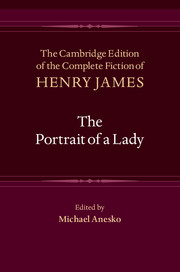Book contents
- Frontmatter
- Contents
- List of Illustrations
- Acknowledgments
- List of Abbreviations
- General Editors’ Preface
- General Chronology of James’s Life and Writings
- Introduction
- Textual Introduction
- Chronology of Composition and Production
- Bibliography
- The Portrait of a Lady
- Glossary of Foreign Words and Phrases
- Notes
- Textual Variants
- Emendations
- Appendices
Chapter 53
Published online by Cambridge University Press: 11 April 2021
- Frontmatter
- Contents
- List of Illustrations
- Acknowledgments
- List of Abbreviations
- General Editors’ Preface
- General Chronology of James’s Life and Writings
- Introduction
- Textual Introduction
- Chronology of Composition and Production
- Bibliography
- The Portrait of a Lady
- Glossary of Foreign Words and Phrases
- Notes
- Textual Variants
- Emendations
- Appendices
Summary
IT was not with surprise, it was with a feeling which in other circumstances would have had much of the effect of joy, that as Isabel descended from the Paris mail at Charing Cross, she stepped into the arms, as it were—or at any rate into the hands—of Henrietta Stackpole. She had telegraphed to her friend from Turin, and though she had not definitely said to herself that Henrietta would meet her, she had felt that her telegram would produce some helpful result. On her long journey from Rome her mind had been given up to vagueness; she was unable to question the future. She performed this journey with sightless eyes, and took little pleasure in the countries she traversed, decked out though they were in the richest freshness of spring. Her thoughts followed their course through other countries—strange-looking, dimly-lighted, pathless lands, in which there was no change of seasons, but only, as it seemed, a perpetual dreariness of winter. She had plenty to think about; but it was not reflection, nor conscious purpose, that filled her mind. Disconnected visions passed through it, and sudden dull gleams of memory, of expectation. The past and the future alternated at their will, but she saw them only in fitful images, which came and went by a logic of their own. It was extraordinary the things she remembered. Now that she was in the secret, now that she knew something that so much concerned her, and the eclipse of which had made life resemble an attempt to play whist with an imperfect pack of cards, the truth of things, their mutual relations, their meaning, and for the most part their horror, rose before her with a kind of architectural vastness. She remembered a thousand trifles; they started to life with the spontaneity of a shiver. That is, she had thought them trifles at the time; now she saw that they were leaden-weighted. Yet even now they were trifles, after all; for of what use was it to her to understand them? Nothing seemed of use to her to-day. All purpose, all intention, was suspended; all desire, too, save the single desire to reach her richly-constituted refuge.
- Type
- Chapter
- Information
- The Portrait of a Lady , pp. 539 - 546Publisher: Cambridge University PressPrint publication year: 2016

